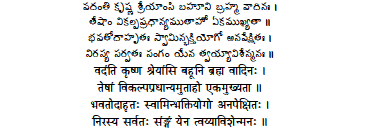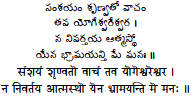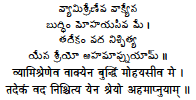Srimad Bhagavatam
Chapter 14 Skandha 11
Uddhava Gita : Chapter 9
Chapter 1 , Ch 2, Ch 3, Ch 4, Ch 5 , Ch 6
Uddhava Gita Chapter 9: ( Summary).
Uddhava starts by asking if all the means of attaining well being are equally important or if one is foremost among them .
Krishna forthrightlytells Uddhava that the devotional service is not matched by any other form of service.
Then Uddhava asks him about the posture and form on which one should meditate. Krishna elaborates on his own form of four hands etc as the form to be meditated upon.!!
Uddhava says

"O Krishna! Learned Sages speak of many ways of “advancement in life”. Tell me if all these are equal in importance or whether one of them is supreme. O Lord you have stated clearly the devotional service without material desires, which also removes attachments enabling one to fix his mind on you”
Uddhava Gita:
Chapter 9
Uddhava starts again by asking Lord Krishna:
“O Krishna, Learned Sages speak of many ways of “advancement in life”. Tell me if all these are equal in importance or whether one of them is supreme...
“O Lord you have stated clearly the devotional service without material desires, which also removes attachments enabling one to fix his mind on you”
Bhagavan then elaborates on both questionsof Uddhava and says :
"By the influence of time and at the time of annihilation the knowledge of Vedas was lost. Then again atthe time of creation I revealed the same to Brahma because I am the purport of the Vedas. Lord Brahma taught this Vedic knowledge to his oldest son Manu and from Manu the seven most learned sages led by Brighu accepted the same. From those fathers it passed on to their sons namely Devas, Asuras, and Guhyakas, human beings, Siddhas, Nagas, Rakshasaaskimpurushas and all others. For all those different entities the essential nature is generated from the three modes of life namely “Satva”, ‘Rajas” and ‘Tamas'. Because of the different characteristics of living entities there are a great many Vedic words (rituals) flowing providing for the diversity".
"Thus because of the great variety of natures there are also different philosophies of Life by tradition. Some of them are even atheistic philosophies not following Vedas".
"O Uddhava people deluded by my Maya describe various ways according to their own activities and their own taste as a means to attain the realization".
"Some mention pious activities as a mean to the Goal. Some say fame, some say truth, some say self control and peacefulness, others mention splendor gifts and food. Some other say sacrifice, austerity, charity vows, moral rules. All of them lead to action and results attained through action have a beginning and an end. They produce misery end in infatuation. They give transient happiness and end in grief".
"Uddhava how can one attached to sense objects have the bliss which a man obtains by giving up everything and focusing his mind on me alone. For the man who desires nothing, who is balanced in his outlook and who believes in me- all directions portend happiness only..! "
"The man who surrendered his mind to me desires me alone and does not desire the position of Brahma or that of Indra, or the ruler-ship of other worlds or the powers obtained by Yoga".
"Uddhava! Know this neither Brahma, nor Shiva, nor Baladeva, nor Lakshmi, nor my own form is as very dear to me as you , the devotee !!".
"Venerable sages devoted to me, and unencumbered by desires, being calm and compassionate to all creatures derive the bliss of association with me. This they only know and not others".
"A devotee of mine, though not a master of senses, is still not overcome by the desires because of his powerful devotion. Just as a fire would turn firewood into ashes, so does devotion to me completely burns the sins committed by my devotees to ashes. Oh Uddhava neither Yoga, nor Sankhya, nor piety, nor austerity or renunciation captivates me so much as the strongly developed Devotional service unto Me".
"Uddhava I am attainable by devotion alone which is the outcome of faith. The devotion to me purges even a dog eater of his sins. Neither religious activities endowed with truthfulness, nor compassion coupled with austerity never wholly purifies a mind which is devoid of devotion..
"Without the thrill of devotion how can heart melt? Without the bliss of tears of happiness how can one render devotional service? Without such service how can consciousness are purified".
"A devotee whose speech is choked, whose heart melts, who with cries without feeling ashamed ,who sings out loudly or dances in loving service to me purifies the whole universe".
"Just as gold when melted in fire gives up its impurities and becomes purified, similarly a soul absorbed in the fire of devotional service is purified of all its contamination as a result of material activities".
"Just as an eyes treated with medicinal ointment recovers its power to see, the mind of a devotee is cleaned by listening to and reciting the tales about me".
"The mind of a man who thinks of sense objects is attached to them, but the mind of who remembers me is merged in me alone".
"Therefore giving up dwelling on unreal things and concentrate the mind on me alone".
"The man of self control should avoid the company of woman and those associated with women. Sitting fearlessly alone they should concentrate on me. Of all bondagearising out of attachments, none is greater than the suffering attached to association with women".
Hearing these forceful arguments for devotion, Uddhava asks again:
O Krishna you explain to me in what way, of what specific nature, in what specific form one should meditate on you
Then Bhagavan tells Uddhava about the posture and the form on which one should meditate.
One should meditate sitting on an even seat with ease , placing his hands on the lap with eyes directed towards the tip of the nose. One should purify the passage of Prana by means of inhalation, retention and exhalation. One should practice Pranayama with syllable “Om” .
The form on which one should meditate is the serene benign face with four long and beautiful arms, with a well formed and beautiful neck, beautiful cheeks and a graceful smile. It is the form with pendants in the well matched ears, with golden cloth, with a dark complexion carrying the marks of Srivatsa and Lakshmi. It is the form adorned with Conch, disc and mace and a lotus.
Lord says “one should concentrate that mind on one part of theform and think of the smiling countenance alone and nothing else. With one's mind so absorbed one sees me alone in oneself and oneself united in me.”
“A yogi who thus concentrates his mind through intense meditation will soon overcome the delusion about objects”
Thus ends Chapter 9 of Uddhava Gita.
----------

“A yogi who thus concentrates his mind through intense meditation will soon overcome the delusion about objects” , limited knowledge and activities associated with gaining merit "

